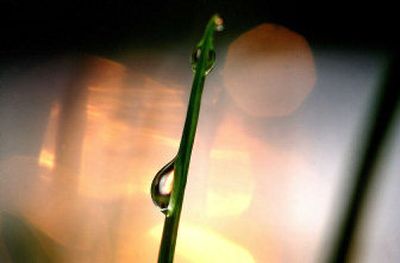Hire a professional

There are many reasons why you may decided to hire a lawn care and spray service to help keep up your yard this year. Perhaps you are uncertain about which chemicals to apply and when. Maybe you are searching for a natural solution that doesn’t involve the traditional chemicals you can pick up at the store. Perhaps you just have too much to do.
“People either want their yards done professionally and in a timely manner, or they lack the knowledge,” says Jim Fritz of Bestway Fuel and Spray in Spokane. With a yard service, “they don’t have to guess at the rates or timing (of applications). Sometimes it’s because they can’t get the right product or the (tree) is too large for them to (spray) themselves.”
With dozens of companies in the region offering a wide variety of services, just how can you sort out what you really need? We’ve talked to two of them and a bunch of experts.
Finding a service
Ask neighbors and friends who they use and what kind of services that company offers. Look around your neighborhood for particularly good-looking yards and ask the homeowner if they use a lawn service.
Interview several companies and ask specific questions about what they apply and how often.
Does the company mix fertilizer applications with weed control applications? If you don’t want weed treatments on all of the lawn, will they apply it separately? Will they check for the presence of insects before they spray and if they don’t see any, not spray? How do they coordinate spray applications with lawn-mowing schedules? Lastly ask for references and when you get them, always check them out.
Make sure your service is bonded and insured. Each spray application crew must have at least one person licensed by the state’s department of agriculture to apply the chemicals.
Fertilizing
Washington State University recommends fertilizing lawns about four times a year: around May 1, in late June, mid-September and late October to early November with a slow release fertilizer that feeds the lawn in measured amounts. Grass is growing actively at these times and will quickly pick up the fertilizer.
Weed spraying
Weeds must be sprayed when they are actively growing to get good control. Most weeds are active by mid- to late-May and again in September when the weather cools. Mid-summer sprays are not as effective, because the weeds are stressed by the heat and they may not respond as intended.
Crab grass, clover and oxalis require a pre-emergent treatment right around now (early April) and again in late summer. Treating them with surface sprays will not be as effective.
Consider asking your service to apply weed treatments independently of fertilizations. By spot treating just the weeds you keep unneeded chemicals out of the environment.
Insect spraying
The timing and frequency of insect sprays should depend on the plants in your yard and the bugs they may attract. Applications should be made based on the actual presence of bugs and their lifecycle rather than a set timetable. This is especially true if you have fruit trees and can’t live with a few worms in your fruit.
In general, ask your spray service which bugs they will look for, what they will use to treat them and how they determine the timing. There is no need to spray for a bug that’s not around.
Natural options
Organic lawn and yard care involves the use of fertilizers and control chemicals that are derived, for the most part, from natural sources and materials.
Fertilizers are often made from dehydrated poultry waste, feather meal and other natural materials. Natural fertilizers bind with organic material in the soil and don’t leach through the soil like synthetic fertilizers do, says Karl Mills of A Natural Solution, a natural-based yard service that operates in Spokane and Kootenai counties.
Mills uses a corn gluten-based pre-emergent weed control that controls many weeds by not allowing them to germinate in the first place. This keeps the need to spot treat to a minimum.
Insect control is achieved using either biological agents like several different types of bacteria, or naturally derived chemicals.
Organic and natural yard care does take more attention to the real time conditions in a yard, such as watering and having the right plants in places where they naturally thrive.
“We try to get the plants as healthy as possible because the healthier they are, the less bugs they are going to get,” says Mills.
And perhaps, one could add, the more joy you are going to get from your yard.